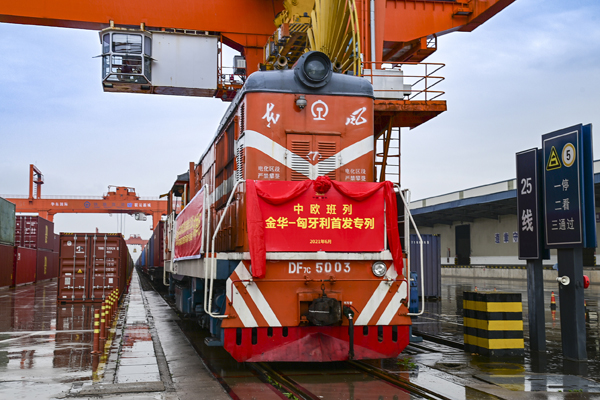
A China-Europe Express Train from Jinhua, Zhejiang province, sets off for Budapest, Hungary, on June 7, carrying 100 containers loaded with electronic products and machinery parts. The train arrived in Budapest 18 days later. [Photo/CFP]
Express cargo train operations between two countries launched over 4 years ago
Hungary is looking to emphasize its role as a land transportation hub for China-Europe freight trains as it aims to further promote comprehensive cooperation between the country and China in the fields of modern trade, logistics and e-commerce, said a Hungarian official.
Hungary's Minister for Innovation and Technology Laszlo Palkovics said further steps for railroad infrastructure were taken by the Hungarian government to emphasize the country's role as a central European logistics hub.
"We are proud to say that today, all major Chinese and European trains are concentrated in Hungary with dozens of European inland railroads crisscrossing the country, allowing goods to be delivered to all major European cities within a short period of time via a well-developed and continuously improving rail network," Palkovics said.
On April 21, 2017, the first China-Europe Express Train from Xi'an, Shaanxi province, arrived at Budapest, capital of Hungary, after 19 days and traveling 9,300 kilometers, with 41 carriages loaded with various goods. It was the first China-Europe Express Train journey between China and Hungary.
Hungary became the second central and eastern European country to be directly served by the China-Europe Express Train after Poland.
Currently, seven cities and regions-Changsha in Hunan province, Xi'an in Shaanxi province, Chengdu in Sichuan province, Chongqing municipality, Jinan in Shandong province, Ganzhou in Jiangxi province and Jinhua in Zhejiang province-are connected, moving their products through Hungary with the established, scheduled China-Europe freight trains.
"Over the past year, we witnessed the transformation the COVID-19 pandemic brought to the world, but despite the heavily disrupted global supply chains during these extraordinary times, China-Europe Express Trains managed to keep the Eurasian supply chains running seamlessly," he said.
Palkovics said the new model of innovative cooperation on the Silk Road Economic Belt is a worthwhile project in the Belt and Road Initiative cooperation between China and Hungary.
"It creates the environment for Hungarian enterprises to provide modern and efficient logistics and trade services for Chinese enterprises, one-stop services for the whole chain of international warehousing, support the establishment of digital supply chains and the international marketing of new industries while also helping Hungary and China to further strengthen facility connectivity and trade flows."
In 2019, Hungary invested in the development of the Ukrainian-Hungarian railroad corridor at Zahony as part of the Belt and Road Initiative-a route providing a solid guarantee for the future passage of China-Hungary freight trains.
With the additional development in the southern Budapest-Belgrade path, as well as with the establishment of industrial parks on the eastern borders of Hungary and the European Union, the country seeks to play a central role in regional logistics, maximizing its favorable conditions and regional endowments.
Transforming the eastern region into a major transportation hub, trains will be able to reach 13 major cities in 10 different countries along the different lines, with all running through Zahony, Palkovics said.
He added that Hungary envisages that by 2030, the capital cities of the Visegrad Group countries-Warsaw, Prague, Bratislava and Budapest-will be accessible via high-speed railway lines from Budapest.
"The Hungarian government considers the implementation of a modern, competitive railway transport system to be a priority.
"We believe that the backbone of domestic transport is railways, which must be secure, reliable, innovative, sustainable and flexible."
Citing the Budapest-Belgrade railway line, he said the modernization of the railway line under the framework of the BRI is one of the main benchmark projects of Sino-Hungarian cooperation.
"With the renovation of the railway line, Hungary will offer the fastest transport route for Chinese goods between Greek ports and West Europe. Recently, traffic at the port of Piraeus in Greece has increased almost tenfold and therefore it is in Hungary's interests to have Chinese goods reach West Europe the fastest way possible through Hungary," he said.
According to their goals, the travel time of railway cargo transport between East Asia and Europe will be reduced from 24 to 14 days, he added.
Looking ahead, Palkovics said more efforts will also be made to deepen bilateral cooperation on multiple fronts.
"Mutually beneficial successful initiatives around the various fields of cooperation not only bring more job opportunities, but also increase the confidence of Chinese companies in Hungary. Due to the continuous support from the governments and the comprehensive strategic partnership, Hungary now has become an important transit and distribution center for entering the European market while also becoming a key destination for many Chinese companies," he added.
As demand continuously grows for inland transport opportunities, Hungary is devoted to further increasing its role in connecting regions with advanced and safe logistics with the help of Chinese friends and partners, within various frameworks of cooperation, he said.
"We support free and fair global trade, which is more important than ever before: the fewer the obstacles, the faster the recovery," he added.